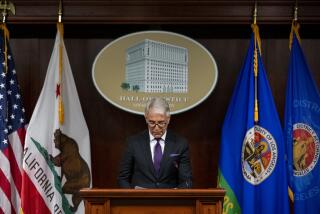Ex-Starr Aide Did Not Intend to Deceive, Lawyer Tells Judge
- Share via
WASHINGTON — A former aide to Kenneth W. Starr had no intention of deceiving a federal judge by denying in a sworn affidavit that he was the source of a controversial news story relating to the Monica S. Lewinsky investigation, a defense attorney argued Tuesday.
In closing arguments in the four-day criminal trial of the ex-aide, Charles G. Bakaly III, defense lawyer Michele A. Roberts appealed to Chief U.S. District Judge Norma Holloway Johnson to get inside Bakaly’s mind. Bakaly’s declaration that he had provided “no information” referred only to secret grand jury information, Roberts insisted.
Johnson, who presided over Bakaly’s trial without a jury, took the case under advisement. She said that she would announce a verdict about mid-August.
Prosecutor Urges Guilty Verdict
Bakaly, who reiterated under cross-examination Tuesday that he had sought to be truthful in his court declaration, could face up to six months in prison and possible disbarment if convicted of having submitted a false statement to Johnson.
Federal prosecutor Alan Gershel, arguing for a guilty verdict, charged that Bakaly’s flat denial of involvement in a Jan. 31, 1999, story in the New York Times “obstructed the administration of justice” as investigators looked into the source of the leak.
The front-page article said that Starr had concluded he had the authority to seek an indictment of President Clinton while he was still in the White House. The story quoted unnamed “associates of Starr.”
Trial testimony showed that Bakaly, after initially denying any responsibility for the story, later told FBI agents in a series of interviews that he had met with the newspaper’s reporter three times and had two dozen phone conversations with him.
He also acknowledged faxing the reporter an edited version of an internal memo from Starr’s office that discussed legal issues surrounding a presidential indictment.
Based on this evidence, Starr forced Bakaly to resign in March 1999 as his chief spokesman and counselor, and the former Los Angeles lawyer was charged in a sealed grand jury indictment with lying to Johnson. Starr resigned as independent counsel last fall.
At the time of the inquiry last year, investigators operated on the theory that the article contained privileged grand jury information, known as 6-E material, disclosure of which constitutes a grave offense.
However, the U.S. Court of Appeals for the District of Columbia later ruled that no 6-E material was involved.
Federal prosecutor Gershel cited testimony by Bakaly on Monday that his allegedly false declaration was written by another lawyer and that Bakaly had suggested changes to make it more complete, which were rejected.
“Mr. Bakaly had the right to say: ‘No, that’s not right. I won’t sign that.’ He didn’t do that,” Gershel told the judge.
The prosecutor noted that Bakaly later told FBI agents he had confirmed for the reporter that Starr faced four options in relation to Clinton:
The independent counsel could indict immediately, he could decide against indicting, he could return a sealed indictment or he could indict Clinton after he leaves office.
Declaration Is Called a ‘Lie’
“This information came from inside the independent counsel’s office,” Gershel said. “Yet, Mr. Bakaly said in his declaration: ‘I refused to confirm or comment on what Judge Starr or the OIC [office of independent counsel] was thinking of doing.’ His declaration was a lie.”
Roberts, however, said that Bakaly’s declaration meant that he had not provided any secret grand jury information.
“The focus was on 6-E material,” Roberts insisted. “Mr. Bakaly never told the court that he was not the source of any information. That is the only fair reading of his declaration.”
Johnson asked both sides to submit proposed findings of fact in writing by Aug. 11. She said she would announce a verdict soon after that.
More to Read
Sign up for Essential California
The most important California stories and recommendations in your inbox every morning.
You may occasionally receive promotional content from the Los Angeles Times.













